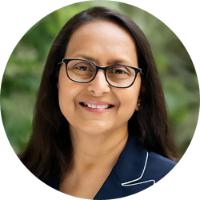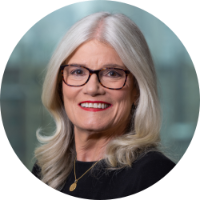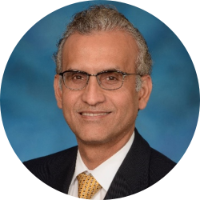The Society of Critical Care Medicine’s (SCCM) annual Critical Care Congress is an opportunity for critical care professionals from around the world to come together to discuss the latest trends and opportunities in the field. Attendees will also have the opportunity to hear the perspectives of thought leaders in critical care medicine. The 2025 Critical Care Congress will feature several thought leader sessions sure to ignite discussion among attendees.
Advancing Health at the Speed of AI
Sunday, February 23, 2025 | 9:00 a.m. – 9:30 a.m.
 |
Hoifung Poon, PhD
William C. Shoemaker Honorary Lecture
General Manager
Microsoft Health Futures
Affiliated Faculty
University of Washington Medical School
Seattle, Washington, USA
|
Knowledge changes over time. A few decades from now, practices that are common today may be unimaginable. Hoifung Poon, PhD, believes in that future. He also believes that AI will help identify how to improve patient care. In his thought leader session at Congress, Dr. Poon will talk about AI and the role he thinks it should play in healthcare, specifically in critical care medicine.
“Biomedicine has witnessed rapid digitization, just as in many other fields,” Dr. Poon said. “Every day, there are billions of data points collected in clinical care documenting patient journeys from diagnosis to treatment to outcome. Each journey is like a mini-trial, and each encounter provides new information that even the best doctor may not anticipate. AI can potentially help clinical practitioners synthesize and decipher such population-scale, real-world data for optimizing care and accelerating discovery.”
Dr. Poon knows that patients and physicians have concerns about incorporating AI into healthcare, but he sees countless opportunities to use AI that will improve care without threatening patient safety. “AI can first be applied to alleviating manual burden in mundane, repetitive tasks for productivity gain, where AI is supervised with human-in-the-loop verification to ensure accuracy,” said Dr. Poon. “AI can also be used to self-correct hallucination and omission errors, as verification is often much easier than generation.”
Dr. Poon has worked at Microsoft Health Futures for more than 13 years and has been in his current role since March 2023. His responsibilities include leading biomedical AI research and incubation, with a focus on scaling real-world evidence generation for precision health. He knows that AI is just one component of larger opportunities and challenges facing healthcare.
“Healthcare and biomedicine are incredibly complex,” he said. “Like any technology, AI plays only a small role in the grand scheme of things. There are so many other social factors that impact the success or failure of adoption―education, policy, regulation, business models. AI can help by serving as a spark or catalyst that alters the return-on-investment landscape so that today’s impossible turns into tomorrow’s plausible.”
Dr. Poon noted futurologist Roy Amara’s observation that people tend to overestimate the short-term effect of a technology and underestimate its long-term effect.
1 “We may be surprised by how profound AI might transform healthcare in the long run,” Dr. Poon said. “Generative AI has tremendous transformative power and can help us reimagine and reinvent healthcare and biomedicine. I hope my session can help attendees better understand AI and its potential in accelerating precision health and improving patient care.”
The William C. Shoemaker Honorary Lecture is named in honor of William C. Shoemaker, MD, FACS, MCCM, a founding member of SCCM and its third president. Dr. Shoemaker was also the founding editor of Critical Care Medicine
.
Climate Change: Why Health Systems Matter Now
Monday, February 24, 2025 | 8:00 a.m. – 8:45 a.m.
 |
Seema Gandhi, MD, MBBS
Ake Grenvik Honorary Lecture
Medical Director of Sustainability
Clinical Professor, Department of Anesthesia and Perioperative Medicine
University of California, San Francisco
San Francisco, California, USA
|
Seema Gandhi, MD, MBBS, believes that anthropogenic climate change poses an existential threat to human health and that resource-intensive U.S. healthcare systems are outliers compared to other high-income countries without commensurate health outcome benefits. She believes that transforming care delivery is necessary to mitigate the health sector’s environmental impact and improve resilience in a rapidly changing climate and that healthcare pollution prevention is a matter of quality and safety. Her thought leader session will focus on supply chain opportunities, greener delivery models, and reducing waste. Attendees will gain tools to engage the workforce and stakeholders and, most importantly, will leave with action items for daily practice.
The Ake Grenvik Honorary Lecture is named in honor of Ake Grenvik, MD, PhD, MCCM, the first SCCM membership committee chair and the seventh SCCM president.
Tissue Perfusion and Microcirculation in Shock
Monday, February 24, 2025 | 1:30 p.m. – 2:15 p.m.

|
Olfa Hamzaoui, MD, PhD
Peter Safar Honorary Lecture
Professor of Intensive Care
Medical ICU, Robert Debré Hospital
University Hospitals of Reims
Reims University
Reims, France
|
Olfa Hamzaoui, MD, PhD, believes the topic of microcirculation and the ways it can enhance patient care have been overlooked for the past 20 years. She believes that this topic has mostly been explored by bench researchers rather than practicing physicians. She hopes to change that. Dr. Hamzaoui’s thought leader session focuses on the potential of microcirculation to improve patient care. Microcirculation is the exchange of gases and fluids at the cellular level, in a network of vessels that typically range from micrometric to nanometric dimensions in diameter.
“I aim to explore the effects of acute circulatory failure on microcirculation in various shock settings,” Dr. Hamzaoui said. “How can we effectively diagnose microcirculatory abnormalities in patients with shock? Furthermore, I would like to discuss management strategies and the importance of coherence between macro- and microcirculation.” Dr. Hamzaoui hopes to demystify the concept of microcirculation. She wants to bridge the gap between research and practical applications and challenge some commonly held beliefs. “There are straightforward tools available for diagnosing and monitoring microcirculatory abnormalities,” she said. “Macrocirculation and microcirculation often work in tandem.”
Dr. Hamzaoui’s goal is to equip attendees with key bedside messages to allow them to apply insights from her session in their institutions and share knowledge with fellow team members. Her topic is particularly relevant to Congress attendees. “For critical care professionals, the management of shock is a vital and frequent aspect of our daily practice,” she said. “Understanding microcirculation can help us address an additional factor that may sometimes be the missing link in improving patient outcomes.”
Dr. Hamzaoui is looking forward to sharing her knowledge with attendees and is equally excited to learn from attendees. “I am truly excited to meet the attendees, not only to share my thoughts but also to engage in meaningful discussions and exchange experiences with them,” she said. “This exchange of ideas is a valuable aspect of our profession, transcending boundaries and uniting us beyond our individual differences.”
The Peter Safar Honorary Lecture is named in honor of Peter Safar, MD, MCCM, the second SCCM president.
Why the 4Ms Approach to Critical Care Improves Quality: Lessons From the Age-Friendly Health Systems Movement
Tuesday, February 25, 2025 | 8:00 a.m. – 8:45 a.m.
 |
Terry Fulmer, PhD, RN, FAAN
Norma J. Shoemaker Honorary Lecture
President
The John A. Hartford Foundation
New York, New York, USA
|
The John A. Hartford Foundation is dedicated to improving the care of older adults. Terry Fulmer, PhD, RN, FAAN, is its president and is also a member of the National Academy of Medicine, former president of the Gerontological Society of America, and an experienced critical care nurse. She is particularly excited to speak with attendees during her thought leader session, in which she will discuss the age-friendly health systems movement and what attendees should know about it to better care for their patients.
“I worked in the ICU at Massachusetts General Hospital and will never forget how rewarding and how stressful the practice could be,” Dr. Fulmer said. “I cannot wait to share my passion for delivering evidence-based, age-friendly care that helps clinicians do what matters most to them—improving quality and safe outcomes for their patients.”
Dr. Fulmer has conceptualized the development of the age-friendly health systems movement. Core to the movement is the 4Ms framework that is a practical and efficient way to improve care for older patients. The 4Ms are:
- What matters: Align care with each older adult’s specific health outcome goals and care preferences, including end-of-life care.
- Medication: If medication is necessary, use age-friendly medication that does not interfere with mentation, mobility, or what matters to them.
- Mentation: Prevent, identify, treat, and manage dementia, depression, and delirium across all care settings.
- Mobility: Ensure that older adults move safely every day to maintain function and do what matters to them.
“When a patient experiences a critical illness or injury, the 4Ms can make a difference in the number of days before discharge from the unit and decrease subsequent ICU readmissions,” Dr. Fulmer said. “4Ms care reduces the harm that can come in healthcare settings.” Dr. Fulmer explained that the 4Ms framework can trigger questions that might otherwise be overlooked, particularly with older patients, such as:
- Is an advance care plan in place in case patients cannot speak for themselves?
- Who is the patient’s healthcare proxy?
- Are newly prescribed medications compatible with current medications?
- Which in-bed exercises are recommended?
Dr. Fulmer added that the age-friendly health systems movement is more important now than ever before because there is a major disconnect between what older people want from healthcare and what they feel they receive. A recent Harris Poll survey released by The John A. Hartford Foundation and Age Wave found that only 11% of older adults gave the healthcare system an A grade.
2 “Less than one in five older adults report getting all 4Ms,” Dr. Fulmer said. “Those who do receive age-friendly care report much better healthcare relationships and outcomes than those who do not. That’s why the movement is so important.”
Dr. Fulmer is optimistic that critical care professionals can help accelerate the age-friendly health systems movement. “Critical care is complex, and it is hard,” she said. “Each time we can find new ways to improve and streamline effective care, of course we want to do so. SCCM members can lead the way in continually improving care for older adults.”
The Norma J. Shoemaker Honorary Lecture is named in honor of Norma J. Shoemaker, RN, MN, FCCM, one of SCCM’s first nurse members and its first executive director.
The Remarkable Potential of Xenotransplantation
Tuesday, February 25, 2025 | 1:30 p.m. – 2:15 p.m.
 |
Muhammad Mansoor Mohiuddin, MD/MBBS, DSc (Hon), FAST
Max Harry Weil Honorary Lecture
Professor of Surgery
Director of the Cardiac Xenotransplantation Program
University of Maryland School of Medicine
Baltimore, Maryland, USA
|
Muhammad Mansoor Mohiuddin, MD/MBBS, DSc (Hon), FAST, knows his work may come across as science fiction. But for Dr. Mohiuddin, his work is real and its potential is vast. Xenotransplantation is the process of transplanting nonhuman cells or organs into humans. “When a human organ stops functioning, we need to find an alternate way to provide that function,” Dr. Mohiuddin said. “For hearts, you either need another human heart or a mechanical device. Unfortunately, not enough human hearts are available to save all human lives. Using a nonhuman heart that works the same way as the human heart to replace the diseased human heart will help us overcome this shortage.”
During his thought leader session, Dr. Mohiuddin will discuss how xenotransplantation can help millions of people around the world. He expects that attendees will be surprised to see a pig heart functioning in a human or a baboon and doing everything a heart is supposed to do. “My main goal is to communicate that xenotransplantation is close to becoming a clinical reality,” he said. “People should be prepared for the decision when they are offered this option.”
Dr. Mohiuddin believes the content of his session is particularly relevant for critical care professionals. “This group of people deals with the most critical patients and knows how important it is to have an option for people with end-stage organ disease,” he said. “What my colleagues and I are doing can make a huge impact. In the future, patients may not have to die because of organ shortage.”
The Max Harry Weil Honorary Lecture is named in honor of Max Harry Weil, MD, PhD, MCCM, the founder and first president of SCCM.
Register for the 2025 Critical Care Congress to attend these sessions and more!
References:
- Lin P. Amara’s law and its place in the future of tech. IEEE Computer Society. September 6, 2024. Accessed October 14, 2024. https://www.computer.org/publications/tech-news/trends/amaras-law-and-tech-future
- John A. Hartford Foundation. Warning from older adults: care for aging in America needs urgent rethinking. September 17, 2024. Accessed October 14, 2024. https://www.johnahartford.org/newsroom/view/warning-from-older-adults-care-for-aging-in-america-needs-urgent-rethinking



